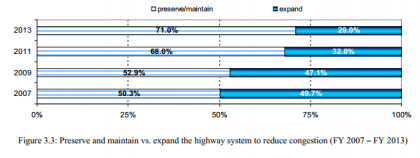
A newly circulated state survey has offered the latest sign that Oregonians are thinking about transportation in a fundamentally different way than they used to.
As recently as 2007, almost 50 percent of Oregonians said it was more important “to expand the highway system to reduce traffic congestion” than “to preserve and maintain the highways Oregon already has.” As of this year, that’s fallen to 29 percent.
For the first time on record, more Oregonians said that “adding sidewalks and bike lanes to existing streets” is “very important” than said “expanding and improving highways, roads and bridges” is “very important”.
Meanwhile, for the first time on record, more Oregonians said that “adding sidewalks and bike lanes to existing streets” is “very important” than said “expanding and improving highways, roads and bridges” is “very important.” In all, 40 percent of Oregonians gave high priority to more walking and walking facilities, while 34 percent said the same of road expansion.
In another new finding from the Oregon Department of Transportation’s 2013 Needs and Issues survey (PDF) (PDF), 40 percent of Oregonians said that “reducing greenhouse gases” should be a “very important” priority for the state transportation agency. Another 38 percent said this is “somewhat important.”
Meanwhile, the number of Oregonians who consider it “very important” to reduce traffic congestion has fallen from 60 percent in 2007 (PDF) to 43 percent this year. The number of people putting high priority on “conserving and protecting clean air and water,” “improving safety features on roadways,” “protecting fish and wildlife habitat,” and “adding sidewalks and bike lanes to existing streets,” meanwhile, are all on the rise since 2009, the first year those questions were asked. Here’s the public’s priority list as it stands now:
Road congestion is still a concern for a large minority of Oregonians, especially in the Portland area. According to the Oregon Department of Transportation, which conducted and analyzed the survey, 52 percent of Portland-area residents see congestion as either “somewhat or very serious.” (The other 48 percent, meanwhile, say it’s “a minor problem” or “not a problem at all.”)
But even in the Portland area, highway expansion isn’t a major priority for most — even when the survey question itself promises that highway construction will “reduce traffic congestion.” Only 32 percent of Portland-area residents said expansion is more important than preservation:
ODOT’s statement about the survey noted that “concern about congestion has dropped since the 2007 survey, possibly because the slow economy and reduced vehicle miles traveled have cut gridlock somewhat, but congestion concerns grew slightly from the 2011 survey.”
In a possible sign that bicycling has become a more polarizing subject since 2009, more Oregonians have begun reporting that they never ride a bicycle, even as the number who feel it’s unsafe to ride in their community has been declining. The percentage of Oregonians who feel biking is safe in their community, meanwhile, has held steady at 40 percent:
The survey, completed in July, was circulated in an Oregon Department of Transportation newsletter Monday. As our local office of the agency formerly known as the Oregon State Highway Department pushes forward projects such as the $118 million Sunrise Corridor now in construction or the proposed two-lane, $400 million widening of Interstate 5 at the Rose Quarter, we hope they’re considering their colleagues’ research on what the public actually wants.
Update Jan. 6: An earlier version of this post incorrectly displayed a table from ODOT’s 2011 report rather than its 2013 report. The analysis, however, was and remains accurate.





